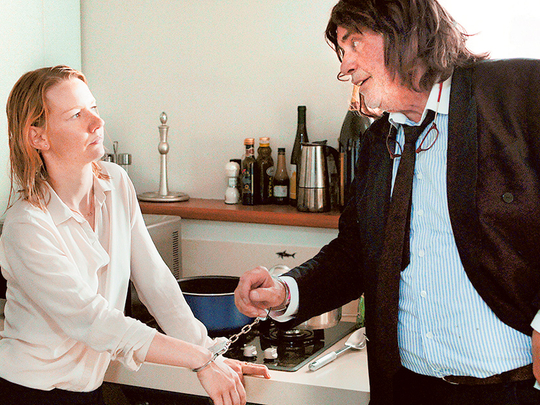
Early in the German comedy “Toni Erdmann,” Ines Conradi (Sandra Huller), a consultant for an oil giant called Dacoil, goes out with clients for drinks. When she mentions her role overseeing the company’s imminent outsourcing plan, the faux pas rattles Dacoil’s chief executive, who peevishly corrects her in front of everyone.
By this point in the evening, the CEO has assigned Ines the humiliating task of taking his wife shopping the next day. When Ines later gives a presentation to the board, she is interrupted, misinterpreted and shut down by her clients plus other members of her team _ nearly all of whom, it scarcely needs to be said, are men.
Did I mention that “Toni Erdmann” is a comedy?
Indeed it is, but for all its uproarious antics, it’s a comedy grounded thoroughly and specifically in the real world. There is nothing particularly funny or far-fetched about the boorishness and condescension with which Ines and her few female co-workers are treated by their male colleagues. Writer-director Maren Ade has the wit _ but also the complete seriousness _ to treat Dacoil as a microcosm of 21st century globalised capitalism, one that carries the scourge of workplace sexism in an unusually toxic, concentrated form.
Ines, in other words, is not alone. Nor is she the only female professional on movie screens this season forced to confront male misbehaviour in her place of business. A quick survey of the field would include Michele LeBlanc (Isabelle Huppert), the Parisian executive whose sexual assault serves as the impetus for the French movie “Elle,” and Elizabeth Sloane (Jessica Chastain), the ruthless Washington, D.C., lobbyist who takes on the gun industry in “Miss Sloane.”
The list would also include real-life women, among them Katherine Johnson (Taraji P. Henson), Dorothy Vaughan (Octavia Spencer) and Mary Jackson (Janelle Monae), the Nasa mathematicians whose hard-earned contributions to 1960s space travel are measured and recognised in “Hidden Figures.” A much less uplifting drama plays out in “Christine,” which recounts the personal and professional despair that led a Florida reporter named Christine Chubbuck (Rebecca Hall) to fatally shoot herself during a 1974 live broadcast.
But perhaps no fictionalised biography, however skilfully done, could compete with the dramatic example provided by recent history. Had Hillary Clinton won the US presidential election, it would have been tempting, and easy, to position these movies in a long-overdue parallel narrative of female triumph. But if anything, the themes that unite these pictures feel all the more pointed and resonant in the wake of Clinton’s defeat.
I can already sense indignant emails being drafted in response from those inclined to attribute that defeat to the candidate’s moral lapses and strategic blunders rather than, say, a culture of ingrained misogyny. To reopen that debate here would, I’m sure, be enormously productive. But it would almost certainly miss the point of what Clinton, whatever her flaws or virtues as a candidate, came to represent culturally and the iconic stature that she achieved as the first woman to come within spitting distance of the most important job in the country.
None of these cinematic heroines and anti-heroines is a direct Clinton analogue, though several exhibit the same qualities at work _ intelligence, ambition, calculation _ that have made Clinton so simultaneously revered and reviled in the public eye. And the movies, perhaps acknowledging the ambivalence that even advanced societies can feel toward the women in power, largely resist the temptation to turn their characters into easy figures of sympathy.
Certainly no movie in the past year so gleefully subverted the notion of empowerment as “Elle” or turned the already fraught minefield of gender politics into such dangerously uncertain terrain. In Paul Verhoeven’s rape-revenge thriller, Michele is the chief executive of a video-game company she runs with her friend Anna (Anne Consigny). The presence of two women overseeing a mostly male staff, churning out violently sexualised fantasies for teenage boys, is hardly incidental to the movie’s inquiry.
Michele’s top designer treats her with open contempt, suggesting that she lacks the qualifications to make important creative decisions about game play. (Michele sarcastically responds that she and Anna must be “bitches who got lucky.”) Later, an office prankster distributes a video clip showing an animated version of Michele being assaulted from behind by a many-tentacled Lovecraftian demon _ a symbolic re-enactment of the violation that sets off the movie.
Michele takes all these indignities in stride. She seems to have achieved her power not by striking fear into her employees _ in the manner of, say, Miranda Priestly in “The Devil Wears Prada” _ but rather by projecting an air of utter indifference to what they think of her. She’s methodical, efficient and a master of the poker face. One of the most enthralling aspects of “Elle” is the way Michele responds to her attacker; even her displays of fear and fury might well be the skilful ploys of a practised problem solver. She troubleshoots her way to revenge.
Elizabeth Sloane, by contrast, leaves little to chance, as we learn from her machinations to get a gun-control bill passed in “Miss Sloane.” “Lobbying is about foresight,” she says, and the pleasure of the movie lies in guessing how Elizabeth, though very much the underdog, maintains the upper hand. At the very least, she doesn’t have to contend with the disrespect of her colleagues and rivals; she may be widely loathed, but she’s also acknowledged as a force to be reckoned with.
Elizabeth is so ruthlessly drawn that at times she suggests a near-caricature of empowered femininity. Viciously eloquent and disdainful of emotional niceties, she’s all hard edges where many men prefer soft curves. Some might take umbrage at the way “Miss Sloane” seems torquate female strength with a deadening of warmth and emotion. But the movie is shrewd enough to offer a compelling counterexample in Elizabeth’s associate Esme (Gugu Mbatha-Raw), an equally passionate crusader who, as badly she wants to win, refuses to sell out her humanity.
Although set during a more distant, restrictive period, Theodore Melfi’s polished and effective crowd-pleaser “Hidden Figures” offers a considerably more uplifting experience, treating the injustices of the civil rights era as the building blocks of Hollywood uplift.
Katherine, Dorothy and Mary stick out at Nasa not just because they’re women but because they’re black, and “Hidden Figures” is particularly deft at conveying the struggle of being a minority twice over. This math-based movie itself demonstrates a talent for multiplication. The focus on three women _ all of them facing equally Sisyphean struggles at work _ allows for a more complex, wide-ranging sense of the obstacles at hand than a more focused telling would have managed.
There is no easy villain here, and the problems of bigotry are shown to be a collective burden. Dorothy’s primary obstacle isn’t a white man but a white woman (Kirsten Dunst) whose refusal to give Dorothy a deserved promotion seems born of her own professional unhappiness. Elsewhere, it’s satisfying to watch as Katherine, wielding her data with masterly assurance, calmly upstages her smug supervisor (Jim Parsons) during a meeting of NASA’s top minds _ a meeting she fights her way into, overturning years of pointless, discriminatory protocol.
But the movie also takes pains to applaud the decency of another manager, Al (Kevin Costner), who sees Katherine’s talent and fights on her behalf. Notably, he acts not because he suddenly grasps that segregation is an abomination but because he realises that it’s actively undermining staff productivity. “Hidden Figures” may have a Hollywood sheen, but it’s quite shrewd about how sweeping changes on one front _ in this case, the ‘60s space race and the rise of electronic computing _ can precipitate necessary social reforms on another.
Technological winds are also shifting in Antonio Campos’ biographical drama, “Christine,” which offers a smart, subtle critique of the commodification of TV news during the 1970s. It’s a time of growing opportunities for women in broadcast journalism, provided they fit a particular mold: chipper blonds, juicy human-interest stories, etc. Nearly everything about Christine Chubbuck _ her hard, guttural voice, her severe on-camera demeanour and her insistence on doing serious, hard-hitting pieces _ represents an affront to this paradigm.
At the same time, “Christine” refuses to treat sexism as a catch-all motive for why Chubbuck pulled the trigger. What makes the movie such a discomfiting experience is that it acknowledges its heroine’s intelligence, integrity and work ethic while remaining unsparingly honest about her very real shortcomings. The other men in the newsroom _ the golden-boy anchor (Michael C. Hall) she loves, the ill-tempered boss (Tracy Letts) she keeps clashing with _ may complicate her path to success, but in the end, Christine’s greatest obstacle may well be herself.
Nearly all of these stories regard the lot of working women with an understandable degree of pessimism. And yet these movies’ existence, and their willingness to confront tough realities head-on, is surely cause for optimism. And while the major studios have not been quite as attentive as their speciality-division counterparts to the needs of thinking, grown-up audiences, they found their own ways of subverting the status quo.
In Denis Villeneuve’s accomplished science-fiction drama “Arrival,” Amy Adams plays a linguist who not only is the best in her field but possesses a crucial gift of intuition _ often described, and dismissed, as a feminine trait _ that holds the key to humanity’s survival. Disney’s impressively woke animated fantasy “Zootopia” centers on a bunny rabbit who overcomes the biases against her species and gender to fulfil her dream of becoming a police officer.
Not to be overlooked is Paul Feig’s “Ghostbusters” remake, which cast four funny women (Melissa McCarthy, Kristen Wiig, Leslie Jones and Kate McKinnon) and immediately became a months-long target of misogynist outrage. The ferocity of all that fanboy hatred became the movie’s unavoidable subtext and perhaps even its text: How dare they send in women to do a man’s job! (They dared _ and, in a further skewering of Hollywood formula, they even cast Chris Hemsworth as the office mimbo.)
That the result wasn’t a particularly memorable movie only seemed to further underscore one of its more infuriating lessons, namely that male mediocrity remains acceptable in American society in a way that female mediocrity is not. Less successful as cinema than as provocation, “Ghostbusters” may offer a more fitting metaphor for the present moment than anyone may have expected from a goofy supernatural comedy about four women just trying to get the job done: It’s a marker of progress, but some of us are ready for a milestone.
___
(c) 2017 Los Angeles Times
Visit the Los Angeles Times at www.latimes.com
Distributed by Tribune Content Agency, LLC.
_____
PHOTO (for help with images, contact 312-222-4194): TONI-ERDMANN







